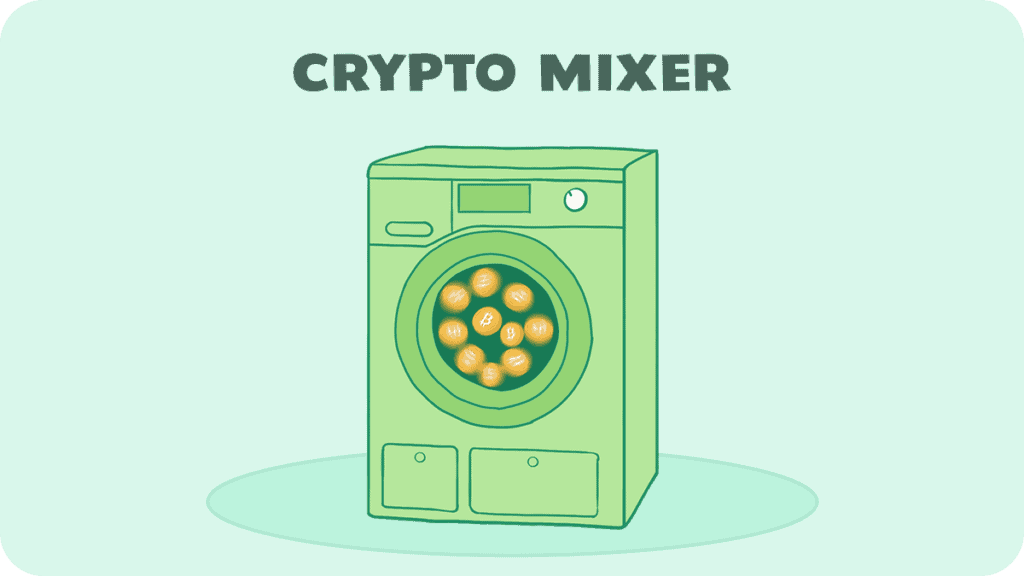Let’s start off with a hypothetical scenario. Say you’re in need of extra cash so you put an ad out in the newspaper saying you’ll do anything for work. A couple days later you get a ring on your telephone and you answer it.
On the other end is a guy named John who wants to meet up and talk about a potential job offer. You accept and meet John in a dark alley with a bunch of his 250-pound friends.
Turns out John is a mob boss, and he has some pretty interesting jobs for you to do, but he doesn’t want to pay you in cash… instead he chooses bitcoin.
Given who he is, you don’t want your bitcoin transactions tied to him as that could cause a few legal implications so you decide to go through a bitcoin tumbling service to make your coins anonymous so they can’t be tracked back to the mob.
But before going any further, we want to say that this article was made for education and entertainment purposes, anything you do outside of this article is on you. Especially if you’re in the mob; we don’t need those kinds of problems here at WhiteboardCrypto.
What is a Bitcoin Mixer?

A bitcoin mixer is a concept that allows anyone to anonymize their cryptocurrencies by allowing a third party to mix up their bitcoin with a bunch of other bitcoins.
At the end of the process, it is very difficult to decipher who’s bitcoin went in and who’s came out, effectively erasing the history of transactions for that bitcoin.
But before we get into the technicalities of what a bitcoin mixer is, let’s explain why you need one. See, any transaction on most blockchains are all public. This means you can literally see and track where all the money is going.
If I send you money, I can simply click your wallet address, see how much money you have, who else paid you, and where you spent all of your money.
This is a big privacy risk, just imagine if one of the big US banks said “We are releasing all of our customer’s bank statements.” It would be one big problem because nobody wants their bank details leaked.
It’s about privacy. If you have $3 million, you don’t want your neighbor or mother-in-law knowing, but also if you have $3, you don’t want your friends knowing.
Also, let’s say there is a wallet address that is known to be tied to the mob. We look at your account and go “Hmmm, the mob paid you $20,000? Is there something you want to tell us?” We can do analysis and find out who is paying you.
This is good and bad, but usually we want our money matters to be private.
So a bitcoin mixer attempts to fix this. The goal is to hide where your money is going, and where it’s coming from—at least hide it from anyone wanting to know other than yourself.
How Does a Bitcoin Mixer Work?

Imagine if the police were looking for you. The information given says “He was wearing a red shirt.” All we know from this is that the suspect is a guy and that he is wearing a red shirt.
So let’s say you’re running down the street and find a cool bar. You enter the bar to find out it only lets in people with red shirts. Fantastic!
So there’s probably 100 people with red shirts in here, and now the police have absolutely no idea which one to question. At any point, you can run out of the bar unnoticed.
There is no way to track you because it would take too long to search through all the people with red shirts and question them, and maybe by the time they’re halfway done, the bar shuts down.
This is essentially what a bitcoin mixer is. We are mixing up our bitcoin through a bunch of other wallets that essentially want to do the same thing.
As an example, our 1 bitcoin goes in with 499 other people’s bitcoins, and then they mix them up, and send out 1 bitcoin to wherever you want to send it.
Bitcoin mixers, which help obscure the transaction history of bitcoins, do charge fees for their services. They work in a more complex way than we’ve briefly outlined here. The key goal is to really conceal the trail of the bitcoin. To achieve this, a bitcoin can be sent through a mixer numerous times, sometimes even hundreds.
This process makes it extremely difficult for anyone to trace its origin or path, including governments that have advanced technology and extensive resources. The repeated mixing adds layers of complexity, making the bitcoin’s transaction history practically untraceable.
One thing to know about bitcoin mixers is they become more secure as more people use them. For example, if you and I put 1 bitcoin each into a mixer, it would be a 50% guess as to where each bitcoin went.
But if 100,000 people put in 1 bitcoin, the odds are much much lower, and they are exponentially compounded if the mixer tumbles a few times.
Another thing to note, we keep mentioning 1 bitcoin. It doesn’t have to be 1 bitcoin. You could use .00001 or 100 bitcoins. The mixer will chop them up and slice them around so it can’t be tracked simply by knowing the total amount. It would be pretty easy if 420.69 bitcoins went in and then 420.69 bitcoins came out.
One last thing to note, we also keep mentioning bitcoin mixers, but bitcoin was the first cryptocurrency to use this. In fact, any cryptocurrency can create and use a tumbler.
There are Ethereum mixers, Litecoin mixers, BNB mixers, and there will probably be many many more since they are useful and serve a very valuable purpose.
Are Bitcoin Mixers Illegal?

Bitcoin Mixers themselves are simply technology, a piece of code, so they are not explicitly illegal. However, they are commonly used for illegal activities, such as money laundering or structuring.
In 2022, Roman Sterlingov, the CEO of Bitcoin Fog, was arrested for running a bitcoin mixer platform. Specifically, he was arrested under the alleged charges of unlicensed money transmission, money laundering, and money transmission without a license.
You should know that the users of Bitcoin Fog were technically anonymous – all the data required to join was a username and password. It’s not like they are going after everyone who used the service.
Also in 2022, the now-notorious Ethereum mixer called Tornado Cash was sanctioned by the US government and the two developers were arrested. The case is still ongoing, but it’s not seemingly going in the favor of coders.
Basically, it seems like the government is trying to make it so if you write code and someone else uses it for an illegal purpose, you’re at fault. Of course the government doesn’t like mixers, it removes their ability to regulate, control, and track money movement.
We aren’t here to add our political opinion, just to educate, so if you’re worried about being involved in a process like this, but want the benefits of untraceable cryptocurrency trading, you can use what are called privacy coins, such as Monero.
There are other ways to have privacy with your crypto, but they get more complicated. Basically, the more private you are, the less convenient your life becomes. It’s always a trade that you have to decide what is best for you.
Conclusion
In short, the function of a bitcoin mixer can be achieved many different ways, but the intention is to create privacy around the money and cryptocurrency that you own.
With a mixer, you are essentially just mixing up your funds with a bunch of other funds so that your true funds are very difficult to trace, whether you have bought something illegal, or if you just don’t want your parents to know you bought a pregnancy test.
Thanks for reading, we hope you enjoyed it, and we really hope you learned something.

